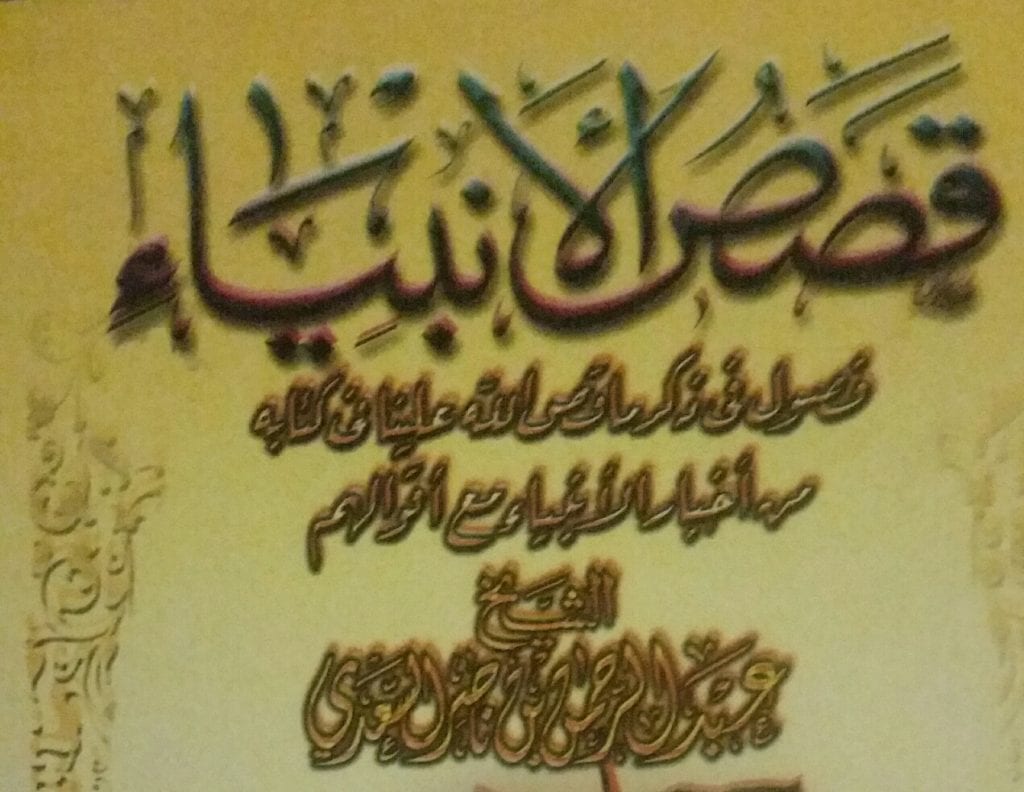Sunday 30 October 2016
The most diseased form of Gheeba
Friday 28 October 2016
Thursday 27 October 2016
Wednesday 26 October 2016
Relation of Husband and Wife
Because women (wives) are the cause of happiness of the heart that is why they are also called the reason to the happiness of the soul. Allah says “And of His signs is that He created for you from yourselves mates that you may find tranquillity in them” [30:21]
Sunday 23 October 2016
CAREFULLY CHOOSING WORDS [IN DIFFERENT CIRCUMSTANCES] WHEN ADDRESSING OTHERS – AN EXCELLENT EXAMPLE FROM PROPHET IBRAAHEEM (ALAYHIS-SALAAM)
Allaah (The Most High) said:
When he said to his father: “O my father! Why do you worship that which hears not, sees not and cannot avail you in anything? “O my father! Verily! There has come to me of knowledge that which came not unto you. [19:42-43]
Imaam Sadi (rahimahullaah) said: Look at this speech that is attractive to the hearts. He [Ibraaheen (alayhis-salaam) did not say to his father, ‘’Indeed, you are a Jaahil (an ignorant person) lest his father is turned away due to rough speech, rather [Allaah said that Ibraaheem said]:
So follow me. I will guide you to a Straight Path. “O my father! Worship not Shaitan (Satan). Verily! Shaitan (Satan) has been a rebel against the Most Beneficent (Allah). “O my father! Verily! I fear lest a torment from the Most Beneficent (Allah) overtake you, so that you become a companion of Shaitan(Satan) (in the Hell-fire).” [19:43-45] [Ref 1]
A Benefit from Imaam Ash-Shanqeetee (rahimahullaah) regarding harshness and softness in their appropriate places; he said:
It is idiocy and an offence to (apply) harshness in a place where leniency is to be (applied), and it is weakness and spiritlessness to apply leniency in a place where harshness is to be applied. If it is said: Apply leniency, say: Leniency should be in its place, for the leniency of a young man in other than its place is ignorance.” [Ref 2]
[Ref 1: Qisas Al-Anbiyaa’ page 45’ by Imaam Sadi (rahimahullaah)]:


[Ref 2: Al-Islaam Deenu Kaamilu’ by Imaam Ash-Shanqeetee (rahimahullaah) page 12]
[To read this in spanish, click here]
Source: http://www.salaficentre.com/2016/10/carefully-choosing-words-different-circumstances-addressing-others-excellent-example-prophet-ibraaheem-alayhis-salaam/
Wednesday 12 October 2016
The Opinion Of The Majority Is Not Consensus: Shaykh Salih Al Fawzan
The Opinion Of The Majority Is Not
Consensus: Shaykh Salih Al Fawzan
Q: Is the opinion of the majority (of scholars) deemed ijmaa (consensus)?
A: No, the majorities’ opinion is not considered as consensus, it is only deemed as the majorities’ opinion and that’s it. For this reason the four Imams (whenever they all agreed on a matter) it was not said about them they had consensus on the contrary it would be said that they agreed. The four imams had agreement in such and such an issue however it is not said a consensus (among all scholars). An agreement (among the four) is not a consensus (among all the scholars).
Translated by Najeeb Al Anjelesi
Source: http://www.alfawzan.af.org.sa/node/2388
[To read this in spanish click here]
Source in English: http://pureislaam.com/2015/10/03/the-opinion-of-the-majority-is-not-consensus-shaykh-salih-al-fawzan/
The Opinion Of The Majority Is Not Consensus: Shaykh Salih Al Fawzan
The Opinion Of The Majority Is Not
Consensus: Shaykh Salih Al Fawzan
Q: Is the opinion of the majority (of scholars) deemed ijmaa (consensus)?
A: No, the majorities’ opinion is not considered as consensus, it is only deemed as the majorities’ opinion and that’s it. For this reason the four Imams (whenever they all agreed on a matter) it was not said about them they had consensus on the contrary it would be said that they agreed. The four imams had agreement in such and such an issue however it is not said a consensus (among all scholars). An agreement (among the four) is not a consensus (among all the scholars).
Translated by Najeeb Al Anjelesi
Source: http://www.alfawzan.af.org.sa/node/2388
[To read this in spanish click here]
Source in English: http://pureislaam.com/2015/10/03/the-opinion-of-the-majority-is-not-consensus-shaykh-salih-al-fawzan/
Monday 10 October 2016
TEACHING THE PEOPLE MAGIC
TEACHING THE PEOPLE MAGIC
Teaching the People Magic by the Muhaddith, Shaykh, Allamaa’ Muhammad Nasiruddeen al-Albaani
Translated by Abbas Abu Yahya
Shaykh Albaani was asked the question: What is the interpretation of the noble Ayaah:
وَاتَّبَعُوا مَا تَتْلُو الشَّيَاطِينُ عَلَى مُلْكِ سُلَيْمَانَ وَمَا كَفَرَ سُلَيْمَانُ وَلَكِنَّ الشَّيَاطِينَ كَفَرُوا يُعَلِّمُونَ النَّاسَ السِّحْرَ وَمَا أُنْزِلَ عَلَى الْمَلَكَيْنِ بِبَابِلَ هَارُوتَ وَمَارُوتَ
<< They followed what the Shayateen gave out (falsely of the magic) in the lifetime of Sulaiman. Sulaiman did not disbelieve, but the Shayateen disbelieved, teaching men magic and such things that came down at Babylon to the two angels >> [Baqarah: 102]
The Shaykh answered:
‘There is no doubt that there is a difference of opinion amongst the scholars of Tafseer regarding this Ayaah. However, that which I personally find to be the strongest opinion is that its meaning is that Allaah – Azza wa Jal- sent down two Angels to teach the people magic, at a time when magic was hugely oppressive and had become widespread. Magic had become confused with the miracles of some of the Prophets. For example, in the story of Musa -Alayhi as-Salaam- and the magicians, Pharoah wanted to mislead the people, at the hands of magicians, away from Musa’s Dawa’ (call) to the truth.
What Pharoah manifested was magic. Then, as we know, Allaah -Azza wa Jal- cut off the actions of the magicians; they submitted and believed in The Lord of all that exists.
Therefore, their knowledge of magic after that point was a means to distinguish between invented matters, magic and reality.
So, in reality, when Musa -Alayhi as-Salaam- threw down his staff:
<< فَإِذَا هِيَ تَلْقَفُ مَا يَأْفِكُونَ >> << and behold! It swallowed up straight away all the falsehoods which they showed>> [Al-Araaf: 117] this was something real which all the people believed. The magicians knew, due to their familiarity with magic that their practice of magic was astray and deceit, which had no basis in reality. So when they were unexpectedly confronted with the miracle of Musa -alayhi as-Salaam – the difference between reality and magic became apparent.
قَالُوا آمَنَّا بِرَبِّ الْعَالَمِينَ
<< They said: “We believe in the Lord of all that exists). >> [Al-Araaf: 121]
So the Wisdom of Allaah -Azza wa Jal – dictated, the sending of two Angels: Haroot and Maroot to teach the people magic. This was not to teach them magic for the sake of it, but so that they (the people) could then distinguish it from the magic used by many evil imposters and liars in those days to oppress the people, subjugate them and enslave them.
This is similar to what was mentioned in the story of the young man and the monk, perhaps you remember it. It is important to mention the summary of that here:
The king at that time – the king of the people of the ditch as mentioned in the Qur’aan[1] – used to employ a magician to enslave the people. When the magician felt that he was getting old, frail and elderly he said to the king, ‘Chose a young man from the people for me so that he can be a successor for you.’ Why did he say this? So that he could continue to enslave the people with this magic. This was how the kings in the past were, they would exploit the people by using magic. So Allaah -Azza wa Jal- sent two Angels to teach everyone magic – unlike the king’s magician, (the king of the people of the ditch) when he said to the king, ‘Chose a young man for me’, because it did not suit him to spread knowledge of magic amongst the people. This is because, in that case, the people would then have realised how the king had subjugated them with the use of magic.
Therefore, the Wisdom of Allaah -Azza wa Jal- dictated that He send two Angels to teach the people magic, in order for them to be able to distinguish between magic and miracles. Also, because magic undoubtedly leads to corruption, Allaah said, in the same context of the same story:
«وَمَا يُعَلِّمَانِ مِنْ أَحَدٍ حَتَّى يَقُولا إِنَّمَا نَحْنُ فِتْنَةٌ فَلا تَكْفُرْ فَيَتَعَلَّمُونَ مِنْهُمَا مَا يُفَرِّقُونَ بِهِ بَيْنَ الْمَرْءِ وَزَوْجِهِ »
<< but neither of these two Angels taught anyone such things till they had said, “We are only for trial, so disbelieve not (by learning this magic from us).” And from these Angels people learn that by which they cause separation between man and his wife >> [Baqarah: 102]
So they went to teach magic for a distinct purpose. However, this learning could turn into a tribulation when they learnt that which harmed them and did not benefit them such as that by which they cause separation between man and his wife. This is my opinion of the Tafseer of this Ayaah, and Allaah knows best.’
[Silsilah al-Huda wa Noor Tape No. 189]
[1] Soorah al-Burooj : 85
English PDF Download: Day 19 – Teaching the People Magic
English Audio: Day 19 – Bite Size Ramadan 1437 – Teaching the People Magic
Taken from: https://followingthesunnah.com/2016/06/24/day-19-teaching-the-people-magic/
Wednesday 5 October 2016
Speaking whilst doing wudhoo?

Shaykh Ibn ‘Uthaymeen was asked about speaking whilst doing wudoo’: is it makrooh?
He (may Allah have mercy on him) replied: Speaking whilst doing wudoo’ is not makrooh, but in fact it distracts the individual, because when the one who is doing wudoo’ washes his face, he should bear in mind that he is obeying the command of Allah, and when he washes his arms, wipes his head and washes his feet, he should bear this intention in mind. But if someone speaks to him, and he speaks to that person, this focus is disrupted and he may also get confused about his wudoo’, and he may be faced with waswaas as a result of that. So it is preferable for him not to speak until he has finished his wudoo’. But if he does speak, there is no blame on him for that.
Fataawa Noor ‘ala ad-Darb by Ibn ‘Uthaymeen.










